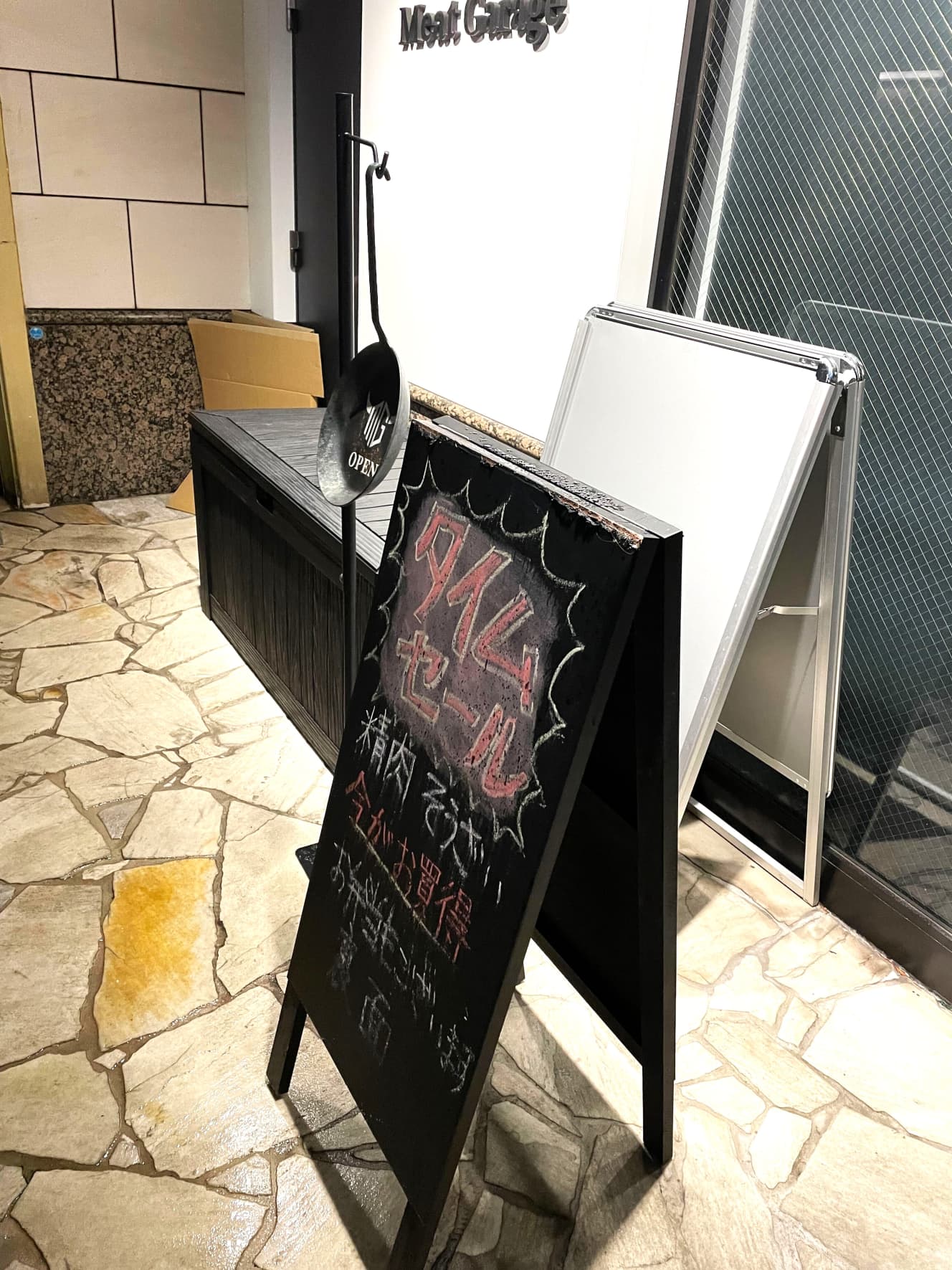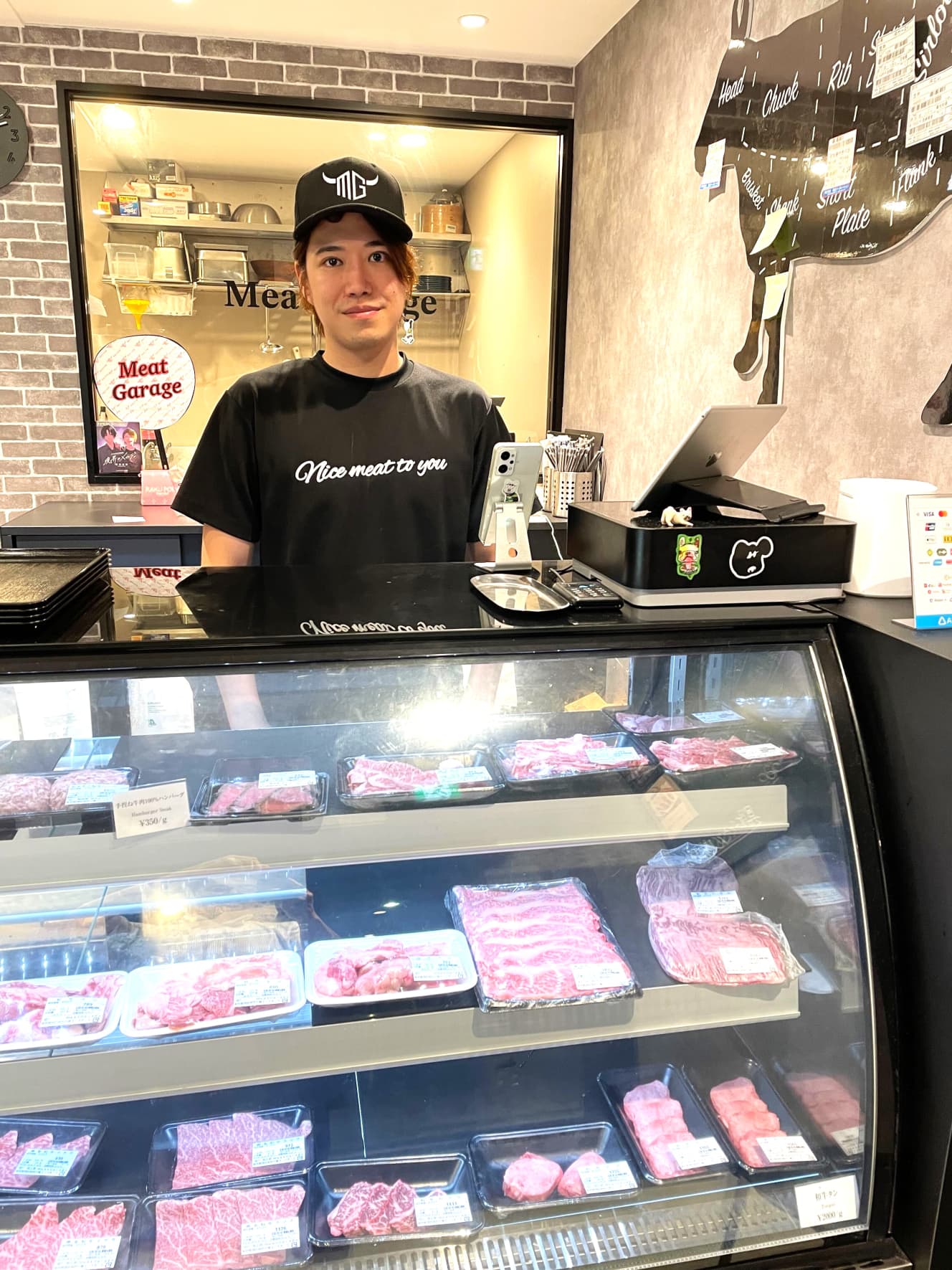Kis-My-Ft2’s Senga’s Brother’s Butcher Shop Transforms into a Celebrity-Fan Paradise!

A Handsome One-Man Operation
“Everyone was really saddened. Some people were even in tears, asking, ‘Why? How come?!’ I had been running the previous shop for three years, and a regular customer who used to come with their kids said, ‘My child has only ever eaten your meat. What should we do now? Where can we buy our meat?!’ That really made me happy.”
At the end of 2023, the much-missed butcher shop “Meat Garage Kitagawa” in Azabu-Juban (Minato-ku, Tokyo) made its return. This time, it has undergone a major transformation, adding an eat-in space and the handsome shopkeeper’s customer service.
The newly renovated store is just about 50 meters from the previous location. The reasonable prices remain the same. The new name is “Meat Garage.” The shop owner, Joi Senga (30), is the younger brother of Kento Senga (33) from “Kis-My-Ft2,” but he insists that the removal of “Kitagawa” from the store name and the dissolution of the old Johnny’s office are unrelated.
“I used to have a business partner, but since it felt like a good time, I decided to go solo when we closed the previous store. That’s why the store name changed a bit. Originally, I wanted to close by the end of the year and reopen right after the New Year. However, it was difficult to find a good property in Azabu-Juban.
So, we thought about doing it in Hiroo, and we had a property lined up. But due to the owner’s circumstances, that deal fell through. Feeling lost, I was wandering around the Azabu-Juban shopping district when I spotted a real estate agency. I was drawn to it, opened the door, and the conversation went smoothly, and that’s how we ended up here.”
The new shop is about two tsubo (approximately 3.3 square meters) larger than the previous one. However, it feels even more spacious than it looked on the floor plan, so Senga decided to expand the eat-in space.
“At my previous shop, we sold bento, but when I think back to my childhood memories of meat shops, it’s always about the menchi katsu. I used to stop by on my way home from school and eat it hot and fresh on the bench inside the store. So, I wanted to offer croquettes, karaage, and other hot snacks here.
But interestingly, when we actually started, it wasn’t just the menchi katsu that became popular. Taco rice also sells really well. Drawing from my experience working in a café, I thought it might appeal to women as something like a salad, so I decided to put it on the menu. We also have burgers, and from the taco rice, we’ve branched out to offer salsa burgers too.”
Since opening this summer, 40% of the regular customers from the previous store have returned, and the number of new customers has also increased. Along with advertising and promotion, the current challenge is addressing the issue of one-man operation.
“I start preparing in the morning, then handle customer service after opening while also cooking the dishes for the eat-in space… before I know it, it’s 8 PM, closing time. I close the register, clean up, and then start preparing for the next day—it’s been like that every day.
I now have one less day off compared to the previous store—only Mondays and public holidays. But even Mondays get eaten up by shopping, so the only day I really get to rest is the public holiday. At the beginning, I was so unfamiliar with everything that it was nonstop chaos. My body really started to show signs of strain. My right eye hurt so much that I couldn’t even open it, and I got stye. It took two months for the swelling to go down and for it to return to normal.
During the Azabu-Juban Festival in August, it was so busy that I worked about 21 hours a day for three days, preparing after the store closed. My right eye started throbbing again, so I immediately used eye drops and prevented another stye. I’ve gradually started to understand my body and how to manage it (laughs).
The struggle got so tough that I ended up watching YouTube videos of one-man operations at small Chinese restaurants. I’d watch these older guys who’ve been doing it alone for 20-plus years and think, ‘They’re like iron men.’ Despite all this, I’m actually considering starting dinner service (laughs). I need to find a good partner who can give me tough feedback and share the vision.”
For Senga, what brings him solace is—once again, his work. At the previous store, he was mostly behind the scenes, handling tasks like meat cutting and cooking. However, at the new store, he stands at the register and interacts directly with customers. He finds joy in those interactions and the communication with customers, saying that it is what heals him.

“I’m so happy to have met the expectations of the customers who had been eagerly waiting for the opening. It’s truly a joy. What’s strange, though, is that for some reason, people bring me souvenirs.
“I went to Disneyland, so here, please have this!’ or ‘I know you haven’t been able to go back home, so I brought you some souvenirs from Nagoya. Hope you can enjoy them and feel nostalgic.’ I’ve even been given things like stomach medicine and energy drinks. I guess the fatigue showed on my face (laughs).”

He’s thinking of adding either a parking space or a terrace seating area in the space in front of the shop.
Kis-My-Ft2 fans come not only from Tokyo but from all over Japan.
“After concerts, many fans stop by in groups or alone. When my brother had an exhibition, we had a lot of customers coming from there. They often order bento and enjoy eating in the eat-in space, spending 3-4 hours chatting.
It’s common for fans who came separately to hit it off and get excited together. Some even stayed until 10:30 PM, eating and drinking. Since many of the customers are Kis-My-Ft2 fans, it’s not rare for them to ask, ‘Can we take a photo with you?’ If they ask, I’m more than happy to do it.
I also had a fan from China come by. She only spoke Chinese and English, so we managed to chat in English, and she enjoyed her bento before we took a photo together.”
When asked which menu items Kis-My-Ft2 fans prefer, Senga replied with a smile, “They order pretty much everything. It seems like they want to try every item on the menu.”
“It’s funny, but there’s a comedian who does impressions of Kis-My-Ft2, and he’s become a regular customer. Sometimes, he gets to interact with fans who come into the store. There was even a time when other members’ families came by, and they were hanging out in the eat-in space, too (laughs). I was really moved by the scene and thought, ‘What an amazing sight.’
My brother’s seniors and juniors from the entertainment industry also stop by casually to buy meat. One time, they asked, ‘We’re having a BBQ, can you pick out some good cuts for us?’ The store was packed with fans, so I had to discreetly do the transaction and hand over the meat outside the store. If they’d been recognized, it could have caused a bit of a panic.
My brother is really supportive. Recently, he ordered 50 bento boxes for the staff. It was tough to make them all by myself, so I kept the manager waiting for a while when they came to pick them up.
I also delivered some meat for a post-event BBQ for my brother and his staff. When I did, some of the staff members told me, ‘The bento you made last time was amazing.’ I think my brother ordered them not just to help, but also to promote the shop. I’m really grateful for that.”

At the shop, customers can also drink alcohol. Currently, they only offer bottled beer, but they plan to eventually serve whiskey, shochu, and wine. Since there are few places in Azabu-Juban that serve alcohol on Sundays, the locals have been eagerly requesting Sunday dinner service.
“I often hear people say, ‘If you start serving dinner on Sundays, I’ll definitely come.’ Even on weekdays, if we offer dinner service, there’s a catering demand. It’s like, ‘Just grill one steak and deliver it to our customers.’ It’s interesting, right?
My family has advised me to cater to inbound tourists. There’s a news story about a $100 steak skewer at Tsukiji that is selling like hotcakes. They’ve been telling me, ‘If you do it in Shibuya, it’ll become popular.’
I do want to run a restaurant in the future, but I still think the meat shop as a foundation is important. I want to become well-known as a butcher first, and then take it from there.
I have a lot of things I want to do. If I wrote them all down in a notebook, it would be an overwhelming amount. I had to narrow it down, and now we’re at this point.
In the short term, my goal is to reach out to the customers who haven’t returned yet through advertising, and to acquire new customers. From the outside, our shop probably seems like a mystery. It doesn’t look like a butcher shop at all. It probably seems more like a steakhouse or a bar, right?
That’s why I’m thinking about putting a terrace outside and doing lunch service. Then, while people are coming for lunch, they can notice, ‘Oh, they sell meat here too, and it’s super cheap!’ And they might end up buying a bento as a side dish.
I also want to eventually enter the market for the steak bento sold at baseball stadiums. It’s something I definitely want to do in the future. Because if you want a steak bowl at Tokyo Dome, it’s easily over 2,000 yen, right? But I can definitely offer a much cheaper and better bento!”
There was a time when he and his brother aimed to become top idols together. However, after many twists and turns, in the new stage he has reached, Senga has begun to shine brighter than ever.
Meat Garage
2-18-2 Azabu-Juban, Minato-ku, Tokyo
https://www.instagram.com/meatgarage_azabu/?igsh=eDRjenI3bm85MWkx

